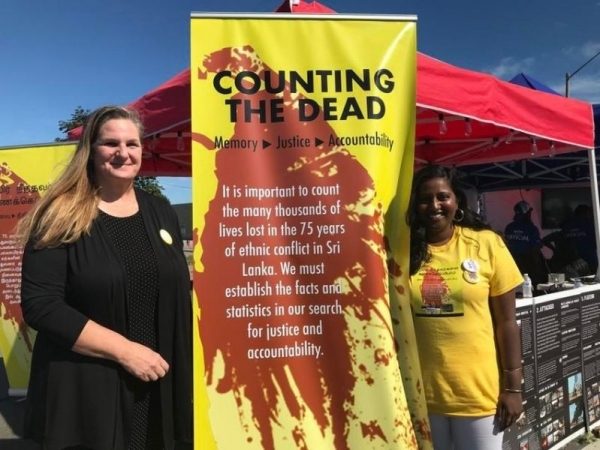
At Toronto’s Tamil Fest, human rights group seeks data on Sri Lanka’s civil war casualties – Toronto Star
Archana Ravichandradeva is sitting behind the table at her booth when a man approaches her with a war story.
His brother was killed in the Sri Lankan civil war, he tells her in Tamil, and he wants his death documented.
She gives him a form to complete online, and asks him to list his brother’s name, date of birth and some other personal information. She tells him the documentation will be provided to the Human Rights Data Analysis Group (HRDAG), a non-profit based in the United States, to help quantify the death toll in the Sri Lankan conflict as part of their recent campaign, Counting the Dead.
Interactions like this happen several times before Ravichandradeva and the team of volunteers pack up for the weekend.
Earlier this year, the Canadian Tamil Congress connected with HRDAG to bring its campaign to Toronto’s annual Tamil Fest, one of the largest gatherings of Canada’s Sri Lankan diaspora.
Ravichandradeva, along with a few other volunteers, spent the weekend speaking with festival-goers in Scarborough about the project and encouraging them to come forward with information about deceased or missing loved ones and friends.
“The idea is to collect thorough, scientifically rigorous numbers on the total casualties in the war and present them as a non-partisan, independent organization,” said Michelle Dukich, a data consultant with HRDAG.
The number of casualties in the Sri Lankan civil war, which lasted intermittently from 1983 to 2009, is widely disputed. Most counts estimate that over 100,000 civilians died on either side of the conflict, though accounts of the final stages of the war, when the Sri Lankan government defeated the Tamil Tigers militia in 2009, vary significantly, with the United Nations estimating the total casualties to be somewhere between 40,000 and 70,000 over a five-month period.
Since the end of the war, human rights organizations have accused the Sri Lankan government of genocide against Tamils. In 2010, the Permanent People’s Tribunal, an international opinion tribunal founded in the 1970s, declared the government guilty of war crimes and crimes against humanity. The government has denied targeting civilians and has rebuffed calls for an outside inquiry.
Ravichandradeva came to Canada when her mother fled Sri Lanka in 1998. Growing up in Toronto, she often listened to her parents tell stories of the war, though she says many of her Tamil friends were unable to speak with their parents about the conflict.
“Our community is, in many ways, traumatized by what happened,” she said. “While we’re growing and thriving in Canada, there’s a reluctance to talk about the past and share stories with the younger generation.”
She hopes the project will help encourage the community to discuss the past in order to seek justice and accountability. By sharing information, she said, groups like HRDAG can compile increasingly robust databases of personal testimony and eyewitness accounts.
Another difficulty, said Dukich, is compiling everything.
“There are all these bits and pieces of data everywhere, listing the names of people that died in a bombing or a riot, but none of them are connected in one comprehensive list,” she said. “We’ll find a news clipping about a bombing in a village that says 200 or 300 people died there, but it won’t have the names of the deceased.”
Events like the Tamil festival are a good place to start, she said. On Saturday, for instance, she was approached by a man who had compiled two books full of the names and information of victims killed in a bombing. Dukich then asked the Canadian Tamil Congress to help translate the information from Tamil to English, before checking her database to ensure there weren’t any duplicate identities.
HRDAG, founded in 1994, has worked on similar data-compilation projects in places like Syria, Kosovo and Colombia.
Kumar Ratnam, a former director of the Canadian Tamil Congress, says the outreach in Toronto’s Tamil community has been successful, if emotionally difficult for some.
“Every family here, including my own, have known people who died or disappeared in the war,” he said. “It’s a very tragic and emotional thing for us, but it’s work that’s nonetheless very, very important to us.”

